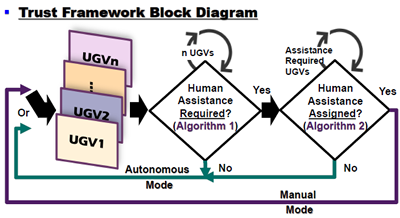Vehicle Controls & Behaviors
Annual PlanOptimal Control, Pairing, and Scheduling for Manned-Unmanned Vehicles Teaming based on RoboTrust Algorithms
Project Team
Government
Dariusz Mikulski, U.S. Army GVSC
Industry
Andrew Dallas, SoarTech
Student
Fangjian Li, Clemson University
Project Summary
Project duration 2016-2018.

Among many factors in human-robot interaction (HRI), trust is the key enabling factor in human’s acceptance and hence utilization of robot. It has been shown that trust is dynamic in nature and trust analysis is useful for task allocation in multi-robot systems. However, the trust evolution in real-time multi-robot operations has not been well addressed in the literature. It calls for further studies of dynamic evolution and propagation of trust in multiple manned-unmanned vehicles teaming. Furthermore, existing works mainly focused on qualitative analyses and the results have not been accompanied by performance guarantees.
Motivated by the need for quantitative trust measures and trust-based teaming for manned and unmanned vehicles, this project seeks to establish trust-based optimal switching control, dynamic pairing, and real-time scheduling algorithms for multiple manned and unmanned vehicles.
The research objectives for Year 1 are: (i) to fill the gap in our fundamental understanding in human-robot collaboration (HRC) systems and trust dynamics, (ii) to create quantitative models for the HRC systems capturing dynamic levels of autonomy (LOAs) and vehicle trustworthiness based on the RoboTrust algorithm developed at the Army, (iii) to develop dynamic human-robot pairing and real-time multi-robot scheduling algorithms, and (iv) to perform Matlab simulation over distributed and heterogeneous multi-agent systems with human-in-the-loop.
The research objectives for the continuing Year 2 are: (i) to develop a general theoretical framework for manned and unmanned teaming in Army applications, especially for multi-robot path-planning problems, (ii) to establish a general RoboTrust based HRC framework, (iii) to implement real robotic experiments to test the proposed frameworks through the Khepera III swarm robot and A. R. drone testbeds as well as a Honda CR-V based steering simulator with motion platform, and (iv) to conduct human subject tests and perform thorough statistical analysis (via both objective performance measures and subjective questionnaires) to compare our proposed algorithms with other existing works.
Publications:
- H. Saeidi, D. G. Mikulski, and Y. Wang, “Trust-Based Leader Selection for Bilateral Haptic Teleoperation of Multi-Robot Systems”, IEEE/RSJ International Conference On Intelligent Robots and Systems (IROS), Vancouver, Canada, September 24-28, 2017.
- Book chapter: X. Wang and Y. Wang, “Co-design of Control and Scheduling for Human-Swarm Collaboration Systems Based on Mutual Trust”, In Trends in Control and Decision-Making for Human–Robot Collaboration Systems, Springer, pp. 387-413, 2017. Print ISBN 978-3-319-40532-2. Online ISBN 978-3-319-40533-9. doi:10.1007/978-3-319-40533-9_16
- F. Li, J. Manning, D. G. Mikulski, J. Wagner, and Y. Wang, “A Trust-based Manned-Unmanned Teaming Strategy for Multi-UGV Guidance and Navigation”, IEEE Transactions on Control Systems Technology (TCST). (in preperation)

